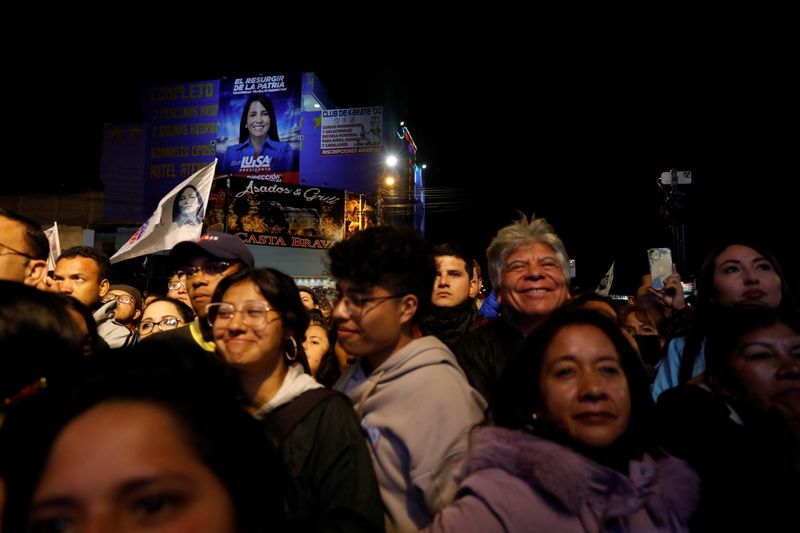By Alexandra Valencia and Julia Symmes Cobb
QUITO (Reuters) -Leftist Luisa Gonzalez and banana industry heir Daniel Noboa will battle for Ecuador's presidency in an October runoff after finishing in the top two in Sunday's first round, as voters' pocketbook concerns loomed at least as large as worries about violence in a campaign darkened by the assassination of a candidate.
Gonzalez, a protege of former President Rafael Correa who has promised to revive his social programs, won 33% support. Noboa, son of prominent businessman and perennial presidential candidate Alvaro Noboa, was a surprise second-place with 24%, providing some reassurance to nervous investors.
The contest was overshadowed by the assassination of anti-corruption candidate Fernando Villavicencio, a killing that is still under investigation. Villavicencio, who was replaced as a candidate by his friend and fellow investigative journalist Christian Zurita, came third with 16%.
Villavicencio's name appeared on the ballot papers because they were printed before his murder.
Referendums to ban oil drilling in a part of the Amazon (NASDAQ:AMZN) and mining in a forest outside Quito easily passed, drawing cheers from Indigenous leaders and environmentalists despite warnings, including from Gonzalez, about billions of dollars of potential lost income and indemnities.
Sharp (OTC:SHCAY) increases in crime, which the outgoing government of President Guillermo Lasso blames on drug gangs, and the struggling economy, whose woes have caused a rise in unemployment and migration, were top concerns among voters.
Center and center-right candidates, including Noboa, took over 45% of the vote. Noboa approaches the Oct. 15 runoff as the relative favorite despite Gonzalez's lead, though the vote is expected to be tight, said analysts.
Should she win, Gonzalez has promised to free up $2.5 billion from international reserves to bolster the economy and bring back social initiatives like scholarships and small business grants.
She has also pledged a firm hand against crime, using improved intelligence to destroy gangs and equipping police with weapons and bulletproof gear.
"Ecuador is on its knees, we'll put it on its feet," she told local radio on Monday.
Noboa, less strident in his security rhetoric than other centrist and center-right candidates in the first round, has said he will improve police training and create community watch programs, as well as speed up processes within the justice system.
His campaign also focused on job creation, tax incentives for new businesses, and jail sentences for serious tax evasion.
Noboa was, like Gonzalez, a lawmaker until Lasso called early elections. He appeared to gain traction after performing well in the only televised debate of the campaign.
"I think this was what was expected after the debate," said local resident Tatiana Pazmino in Quito. "I think that Rafael Correa has left his mark on the country: for many it is positive, others see it as more negative. I think that after the debate, the candidate Noboa showed he was prepared, or at least well-advised."
POLITICAL MACHINE
Though Noboa is likely to look for alliances with candidates who have been eliminated, scoring an ultimate victory will depend on how well he articulates policy proposals, said political analyst Alfredo Espinosa.
"Noboa has tried to sell himself as a businessman and a young technocrat," said Espinosa. "Politics is not comparable to managing a private business, it means generating consensus, generating spaces for dialogue."
Gonzalez, backed by Correa's political machine and its loyalists, especially in working class sectors, is in a strong position, with ideology expected to be at the forefront of campaigning now, the political analyst said.
Correa's Citizens' Revolution party was leading a nearly complete count for seats in the national assembly, with about 39% support, while Villavicencio's Construye party tallied 21% and Noboa's National Democratic Action 14%.
Markets would likely welcome the first-round result, economic analysts said. Noboa's platform seemed aligned with "fiscal prudence," JPMorgan (NYSE:JPM) analysts wrote in a note.
The result allowed the anti-Correa, business-friendly vote to coalesce around a single candidate, said Stuart Culverhouse, head of fixed income research at Tellimer Research.
Last week, Fitch cut Ecuador's foreign currency debt rating further into junk territory on financing risks from deteriorating fiscal accounts, saying default was "a real possibility."
The South American country has nearly $16 billion in debt, with the next payment above $1 billion not due until 2030.

Bond prices were up marginally, about half a point in the 2030 note to 49.25 cents on the dollar.
Ecuadorean spreads to U.S. Treasuries, the premium demanded by investors to hold those bonds over risk-free debt, was 1,734 basis points, from just over 2,000 bps earlier this month.